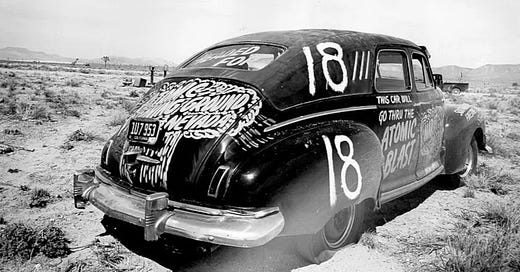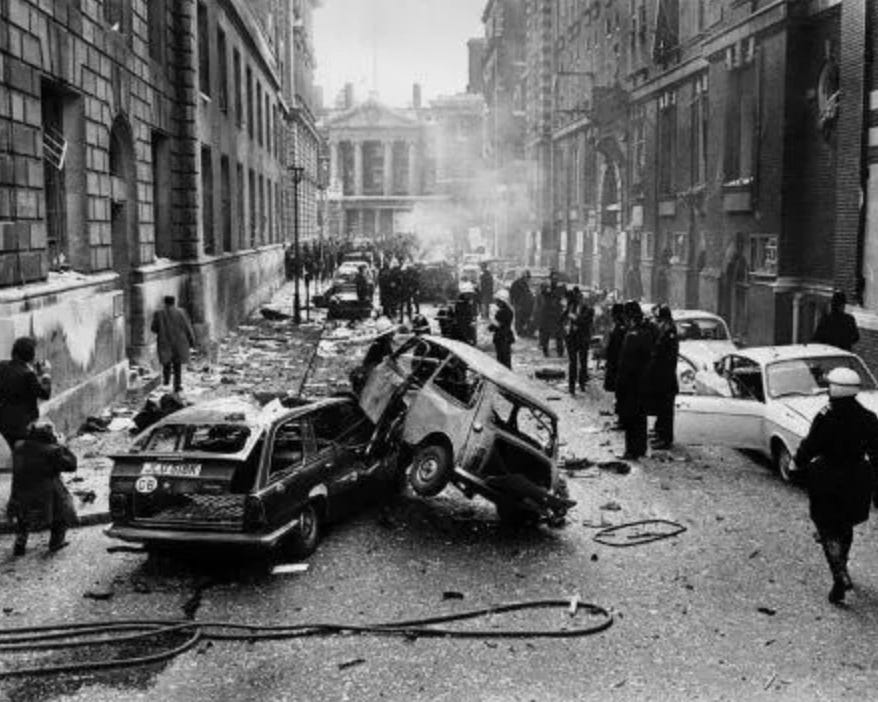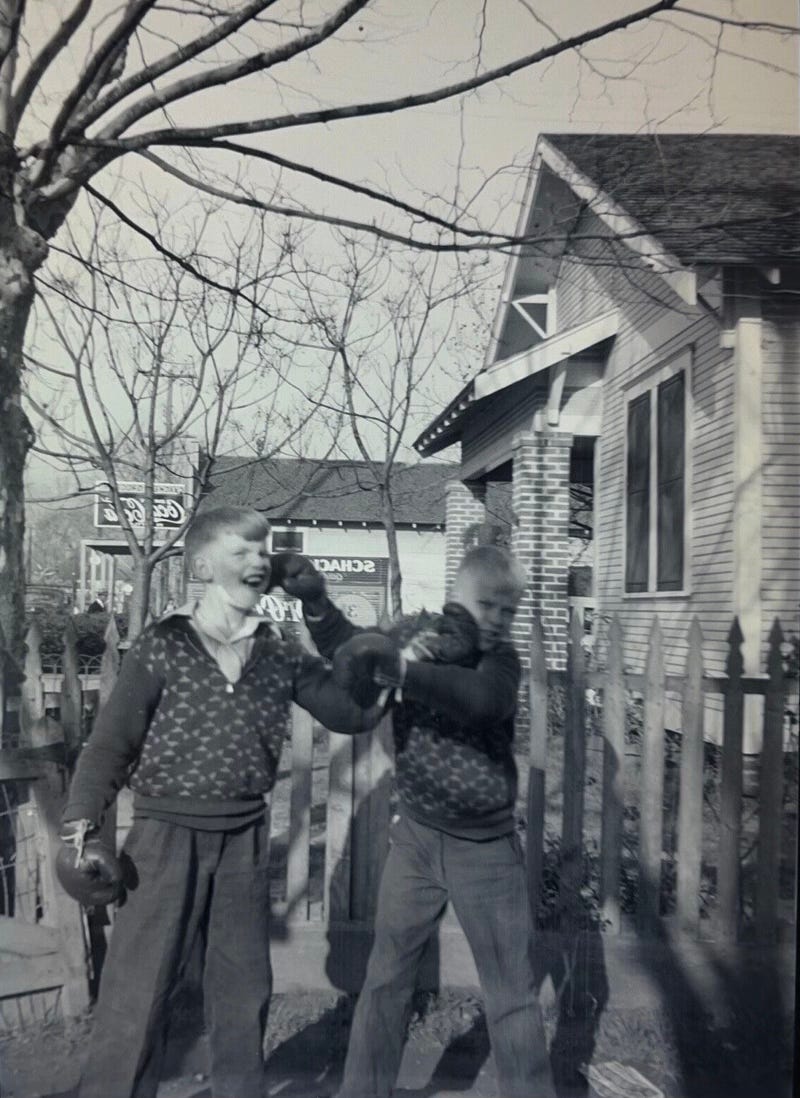I don’t know if two makes a trend. I hope not. But it’s worth noting that 2025 kicked off with two men with different ideologies executing the same plan. Take a car and use it as a weapon. Drive it into a crowd of revelers in New Orleans. Load it up with fireworks and park it in front of a Trump Casino. Make a statement. Act as an avenging angel. Go down in a blaze of self-appointed glory. That’s the idea, at least. The car is optional. What isn’t is the self-aggrandizing kettle of rage, the imagined end of history, the brokenness masquerading as strength.
I try not to be gender essentialist about most matters, including tragic ones. It is not just cisgendered men who do horrendous things, either in private or public. But it is quite often men who do horrendous things— who shoot and strike and write manifestos about why they are correct and why somebody else is to blame.
I was not surprised to learn that the two people who drove the New Years death cars were men. I suspect you were not surprised either. It is true that no one gender has a monopoly on antisocial behavior, but there is only one gender that is taught a specific set of lessons about how to be a hero.
When I heard the news that it was two men in those weaponized vehicles, I immediately thought about a third man. I’ve never met this third man. The only thing I know about him is what I read in the papers, The New York Times specifically. You may have seen the article. It was about two guys in Rome, Georgia— a Mexican immigrant named Jaime and his father-in-law, Sky. Jaime came to this country with his parents. He’s undocumented, but otherwise has done everything he could to assimilate into White Southern culture. Now, with deportations on the way, he and his wife are terrified that those efforts to pass won’t be enough.
It’s a heartbreaking article, mostly about Jaime, but Sky’s presence looms over the entirety of it. He’s a perfect vessel for Blue American Scorn, a Trump voter who expected the cruelty of Trump’s policies to impact other people, not the people he loved. That’s the part of Sky’s story that interests me least, truth be told. Sure, it flatters my prior convictions, but like any other drug, schadenfreude loses its potency after too many doses.
When I say that I was thinking about Sky as I processed the news about cars and guns and explosions and men, what I mean is that I was thinking about one particular paragraph. It’s about what Sky packed to babysit his four grandkids.
He brought along candy for the children and his “go bag” of survival gear, which had traveled with him everywhere for the last several years. It contained all the supplies he thought he might need to be self-sufficient in a power outage or a societal collapse: tourniquets, binoculars, knives, whistles, flashlights, water filters, fire starters, a snakebite kit, a firearm, a slingshot, a Bible.
Jaime and his family live on a quiet suburban cul-de-sac, not an active combat zone. But when Sky shows up to visit two seven-year-old twins and a pair of toddlers, he loads up as if a holy war might break out mid-way through an episode of Bluey. He imagines, I suppose, charging into the fray, a gun in one hand and a Bible in the other. He’s prepared to love his family out loud, as long as that love can manifest through violence against marauders and perhaps snakes.
There are more details to Sky’s story, ones that won’t surprise you. He was a cop. He claims to have “lost his faith in humanity.” Every time he sees an abandoned building, he imagines a potential MS-13 stronghold. While he’s still close with his daughter Jennifer, and her husband, he’s estranged himself from other family members, either because they’re trans or because they’re just too liberal for his taste. He has fashioned for himself a life that is increasingly small and less connected. Sky’s walls are closing in.
Tourniquets/binoculars/knives/whistles/flashlights/water filters/fire starters/a snakebite kit/a firearm/a slingshot/a Bible.
Packed up, ostensibly, for the business of care.
At no point in the article does Sky refer to himself as a “real man” or talk about how the role of real men is to protect their family. That’s clearly the story that he has adopted about his role in the world. The text of the article is all about the contradictions of how Sky voted. But long before Sky learned to lionize Trump, he internalized a story about the world (full of threats) and his place in it (an action hero, the last line of defense against those threats). We’d have a much easier problem on our hand if we could isolate that disease solely based on exit polling.
I stayed relatively quiet during the multiple weeks of discourse about Luigi Mangione. During that cycle, the glee came from those who largely share my politics. I get the collective catharsis. I too believe that the violence committed by white collar employees at desks is as pernicious and toxic as that committed by men with guns. I couldn’t find a home in the memes and celebrations, though. Part of that is my pesky pacifism, a relic of a faith that I love deeply but that keeps me perennially out-of-step with the world. But it’s more than that.
We are in one of those moments when the one thing that everybody— across lines of ideology— seems to agree upon is that the world is crooked, rigged, and full of heartbreak for all but a select few. That’s not an inaccurate reading of the state of our shared precarity, but it still makes me jittery.
Back to Sky. What breaks my heart about his story is that it’s clear that this is a man who wants to care, who would like to love his family. And his family is giving him direct clues as to how he could show that love and care, but he’s bought so far into a contrary story that he can’t hear them. In Sky’s mind, it’s possible to prove his love for Jennifer and Jaime and their kids through brute force, but that’s not what they need. What they’re asking for is connection and empathy. They want him to see that they’re scared, in this case because of how he and so many others voted. They want to hear that he might be scared, too. They want him to admit that he might be wrong.
Tourniquets/binoculars/knives/whistles/flashlights/water filters/fire starters/a snakebite kit/a firearm/a slingshot/a Bible.
When all that you have is a hammer, everything looks like a nail.
There’s so much toxicity in the stories that we men internalize about ourselves: about how we are the heroes of ours and everybody else’s lives, about how every time we feel threatened or diminished in any way that we get to throw a fit, about how the world demands our dominance and force more than it begs us to be alive to the humanity of all those who surround us. To say that we are a ticking time bomb is to diminish the fact that we aren’t ticking at all. We’re always going off.
But I am uniquely on edge about my gender in this specific moment, when a nation of men of various ideologies have correctly identified that the world is not as it should be, but have bought whole hog into a myth of their own heroic righteousness. I am not comforted that some of the men with guns or exploding cars or go-bags full of tourniquets and knives might share my ostensible politics.
I’d argue— my voice made shaky by this noisy, righteous moment— that not only is there no need for avenging angels, but that we don’t really need any heroes, particularly the kind that get the last word and keep a stiff upper lip and that believe in being feared more than loved.
In times like this— where the cost of everything is too damn high, where the authoritarians are triumphant and our primary tethers to the one another are mediated by companies that rip us of, make us angry, and wear down our hearts for an automated future— we need so much more than leaders can provide, even benevolent ones. We need neighbors who clothe and feed one another, who ensure that nobody in our extended circles is lonely, who form human chains when the deportation crews come to town, who brave tear gas together, who raise a million ruckuses in the face of the millions of affronts to humanity that are about to come our way, who tend to meetings that have more empty chairs than filled ones, who march in picket lines, who stand with clipboards in the rain, who bring an extra casserole to the potluck, who play with the children, who have time for the least lovable among us.
We need people who haven’t yet discovered the immensity of humanity around them, and in themselves, but are ready to be surprised.
I am worried because we need all of that, but so far what we are getting instead is men enacting vigilante justice: hatching plans, alternately blowing up their cars or ramming them into crowds, paying too much attention to imagined threats from serpents and Salvadorans and too little attention to their grandchildren.
I am worried because 2025 began with men who had already rigged their lives to explode setting those fuses off in public.
The worst news, always, is the time that’s already passed— all of the days and months and years we’ve spent buying into myths that don’t serve us well. I may never have viewed myself as an avenging angel, but my own deepest shame, as a man, is rooted in all the times when I’ve viewed myself more as history’s grand protagonist rather than a guy who is lucky to live within a web of connection. There is so much that I regret from my own false hero’s journey: lost time, corroded relationships, perpetuation rather than rupture.
The best news, for all of us, is that tomorrow is not wasted. We have far more of 2025 ahead of us than we have in the rearview. And thank God for that. I have a feeling that this year will ask us— all of us— to be neighbors in ways that are likely unfamiliar. I have a feeling that we will be walking together on wobbly newborn deer feet. I am frightened that we have not seen the last of the avenging angels, but I am heartened that we still haven’t tapped into the immensity of our potential love for one another.
My prayers for 2025, secular or religious, whichever you prefer:
That past won’t be prologue.
That we have more to discover than we have to prove.
That those of us who’ve worshipped the gospel of protection and vengeance might discover one of care and connection instead.
End notes:
Happy new year! It is good to have you here, always. I’ll have many announcements coming soon— new perks for paid subscribers, new free Barnraisers trainings kicking off in the late winter (these ones less focused on getting you pumped up to build community and more on supporting each other as we do so— sign up now to find out more) and perhaps some other surprises (I have resisted the siren song of podcasting for a while now, but…that may be changing?). But those are my plans. How are you doing in the new year? As always, feel free to send an email if you’d like to talk in a less public forum: garrett at barnraisersproject.org
I’ve already made the pitch to free subscribers to chip in if that’s an option (January is indeed a slow month for those of us who newsletter-for-a-living, so it helps). Thanks for considering. What I’ll add now, though, is that if you can’t afford all the things you think might help this and other newsletters do in fact help (the sharing and the spreading the word and even just being a general kind, supportive presence).
No song of the week this week! Or at least not one from me. We’re easing into things here, having spent too much time thinking about my 2024 playlist. If you have ideas, let me know. And in the meantime, enjoy previous songs of the week on Apple Music and Spotify.







Thank you, as always, for your words this morning.
This article brought to mind a common refrain from my conservative parents - "we would die for you or your siblings." It took a long time for me to understand why I so disliked that phrase, but it comes down to the fact that "dying" for someone is easy. It means a one-time sacrifice, and as these two men showed us so soon into this new year, it is also "showy."
Contrast that with "living" for someone. That means showing up and doing the work day in and day out. I find it a much more fulfilling version of love and it is what I try to demonstrate for my son.
"I would die for my family."
Yeah, but would you ... do the dishes, fold the laundry, change the diapers, make the beds ... and VOTE in their best interests?